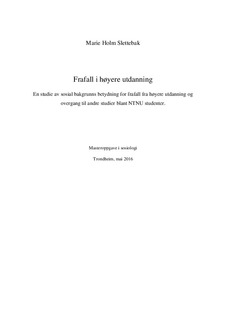| dc.description.abstract | The theme of this thesis is departure from higher education, and my focus is on the relationship between social background and departure. To be more specific, I investigate to what degree social background - measured as the parents educational level - effects the probability of departure from higher education and which mechanisms that can contribute to explain this relationship. Furthermore, I look at the relationship between transfer to other studies within higher education and social background.
I apply Bourdieus theory of reproduction and Boudon and Goldthorpes social position theory to get a better understanding of the relationship between social background and educational choices. The theories represent two different perspectives on how to understand both human agency and educational choices.
The data consists of register data and survey data with information about students that enrolled in a course of study at NTNU between 2004 and 2014. I use multinomial and binomial logistic regression to investigate hypotheses.
My research shows that social background have an effect on the probability of departure from higher education. Students who have parents without higher education, and particularly students who have parents with primary school only, have higher probability of leaving the educational system, than students who have parents with higher education. Grades from upper secondary school and the student’s age can explain much of the relationship between social background and departure. In addition, I find that students with low social background less often participate in student organizations or have study related jobs, more often feel that they don`t fit into the social environment and are more stressed about their student loans than students with higher social background. Together, these factors may help to explain the relationship between social background and departure from higher education.
The analysis shows that background characteristics like parents educational level, grades from upper secondary school and age are more important for explaining departure than transfer. However, by distinguishing between different forms of transfer, I find that social background have an effect also here. Students with low social background have a higher probability of transferring to a university college (rather than another university study) than students with higher social background. | nb_NO |
